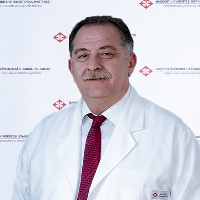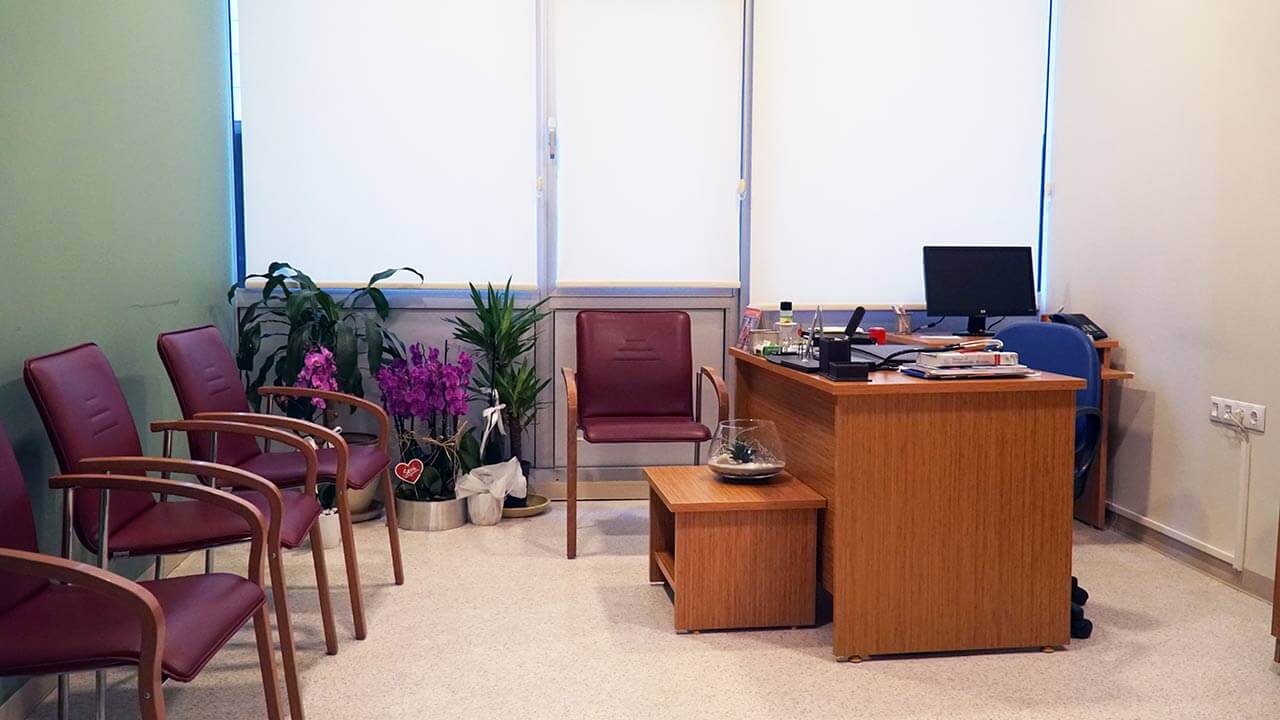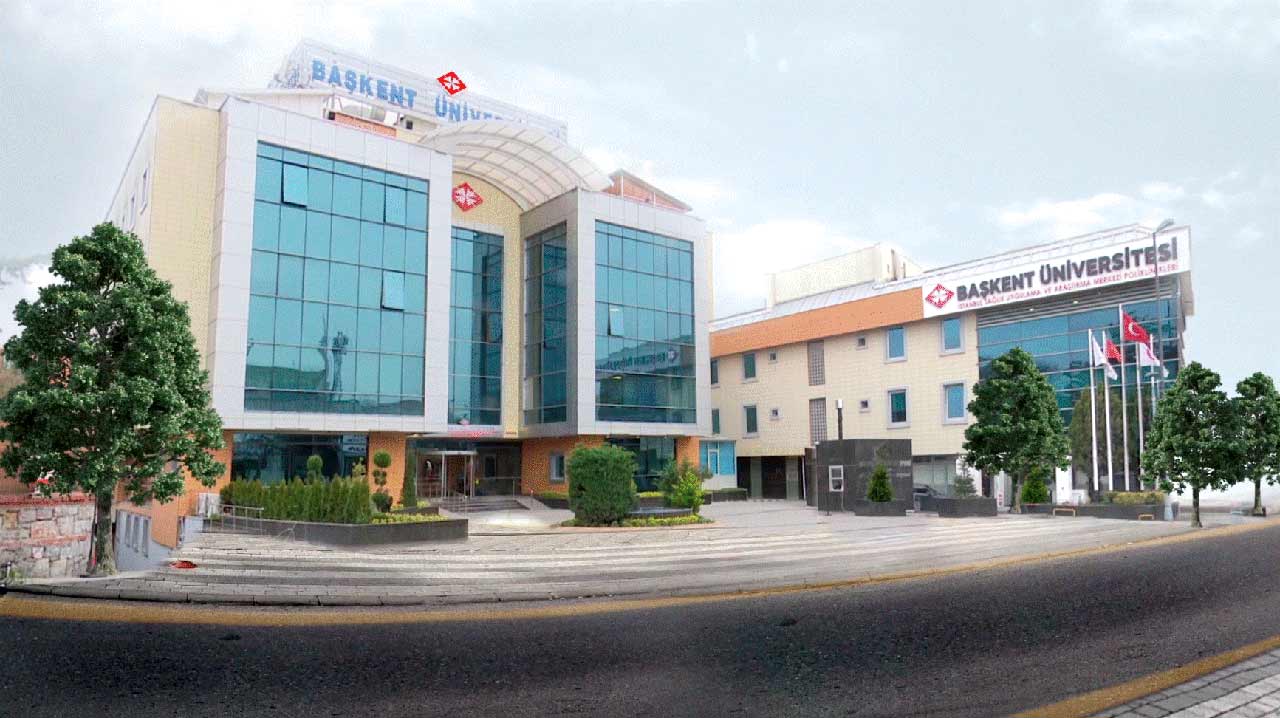
The program includes:
- Initial presentation in the clinic
- clinical history taking
- review of medical records
- physical examination
- laboratory tests:
- complete blood count
- general urine analysis
- biochemical analysis of blood
- inflammation indicators (CRP, ESR)
- indicators blood coagulation
- neurological examination
- functionality x-ray
- neuropsychological tests (on indications):
- ENMG (electroneuromyography)
- SEPs (somatosensory evoked potentials)
- CT/MRI of the spine
- myelography
- preoperative care
- decompressive laminectomy and discotomy (1 segment)
- postoperative control
- symptomatic treatment
- control examinations
- the cost of essential medicines and materials
- nursing services
- full hospital accommodation
- developing of further guidance
Required documents
- Medical records
- X-ray of the cervical spine (if available)
- MRI/CT scan of the cervical spine (if available)
Service
You may also book:
 BookingHealth Price from:
BookingHealth Price from:
About the department
The Department of Adult and Pediatric Orthopedics, Traumatology, Spinal Surgery and Hand Surgery at the Baskent University Hospital Istanbul provides the full range of medical services in its areas of expertise. The department carries out high-precision diagnostics of musculoskeletal diseases, conservative and surgical treatment of orthopedic pathologies and injuries of any severity. The department's doctors provide treatment not only for adults, but also for children under the age of 16 years. The main focus is on arthroscopic interventions on the hip, knee, shoulder, elbow and ankle joints, the surgical treatment of spinal diseases and injuries, as well as on the treatment of sports injuries. The clinical practice involves the use of only the most effective therapeutic methods available in modern medicine. The goal of the department's doctors is to eliminate pain as soon as possible and restore patient's mobility. The department is headed by Prof. Dr. med. Ismet Teoman Benli.
One of the department's primary clinical focuses is arthroscopic surgery on large joints – hip, knee, shoulder, elbow and ankle. An arthroscopic intervention allows performing surgical manipulations on the joint without dissecting it, which greatly facilitates the recovery process after surgery and minimizes the risk of postoperative complications. The department uses arthroscopy for both diagnostic and therapeutic purposes. When performing the operation, the surgeon uses a special instrument, namely an arthroscope, which is inserted into the joint cavity through a small incision (0.5 cm). The arthroscope is also equipped with a miniature camera that transmits an image of the intra-articular space of the joint to a large screen. This allows the specialist to clearly see the smallest anatomical structures of the intra-articular cavity, which excludes damage to healthy tissues. The surgeon injects a special saline solution into the joint cavity, which improves the visibility of the operating field. The arthroscopic interventions are quite often performed on an outpatient basis and do not require patient hospitalization. For pain relief, both regional and general anesthesia can be used. Arthroscopy is indicated for patients with injuries of the meniscus, joint ligaments, cartilage tissues, dislocations, intra-articular fractures, rotator cuff tear, etc. The department's orthopedic surgeons have rich and successful experience in the field of such interventions, and therefore they guarantee a high-quality result.
Spinal surgery is also one of the most important areas of work of the department's medical team. In most cases, the surgeons use sparing minimally invasive interventions that contribute to minimal pain after surgery and ensure rapid postoperative recovery of the patient. When performing spinal operations, the department's surgeons use various computer-assisted monitoring systems that exclude injury to the functionally important areas of the spine. The department's specialists most often perform interventions to correct scoliosis, kyphosis, spondylolisthesis, as well as surgery to treat degenerative changes in the spine, spinal fractures, including osteoporotic ones, infectious lesions, spinal tumors, etc. The operations are performed by specially trained spinal surgeons who have vast clinical experience and successfully cope with even the most difficult cases.
Quite often, a team of orthopedic surgeons treats patients with various shoulder and elbow pathologies, including shoulder, scapular and clavicle fractures, elbow fractures and dislocations, impingement syndromes, rotator cuff tear, post-traumatic stiffness, tennis elbow, golfer's elbow, frozen shoulder. Initially, the department's doctors try to solve the problem conservatively, but if such treatment does not work, the only treatment method for the patient is surgery. Most surgical interventions on the shoulder and elbow are performed using a minimally invasive arthroscopic technique. The specialists resort to open surgery very rarely.
The department's medical team also takes care of the health of the musculoskeletal system in children. The doctors have excellent qualifications in the treatment of hip dysplasia, myelomeningocele, congenital malformations, fractures, flat feet, as well as bone, muscle and soft tissue tumors. When planning the treatment of a child with an orthopedic disease, the specialists always take into account his age and peculiar features of the growing organism.
The main clinical activities of the department include:
- Arthroscopic interventions on the hip, knee, shoulder, elbow and ankle for diagnostic and therapeutic purposes
- Meniscal injuries
- Ligament injuries
- Cartilage damage
- Dislocations
- Intra-articular fractures
- Rotator cuff tear
- Articular lip damage
- Free bodies in the articular cavity
- Spinal surgery
- Scoliosis
- Kyphosis, including Scheuermann's kyphosis
- Spondylolisthesis
- Degenerative changes in the spine
- Ankylosing spondylitis
- Spinal fractures, including osteoporotic ones
- Vertebral fractures and dislocations
- Infectious spinal diseases
- Spinal tumors
- Shoulder and elbow surgery
- Rotator cuff tear
- Subacromial impingement syndrome
- Shoulder instability
- Humerus, scapular and clavicle fractures
- Elbow fractures and dislocations
- Post-traumatic stiffness
- Tennis elbow
- Golfer's elbow
- Frozen shoulder
- Hand surgery
- Carpal tunnel syndrome
- Trigger fingers
- De Quervain syndrome
- Ganglion
- Dupuytren's contracture
- Pediatric orthopedics and traumatology
- Hip dysplasia
- Lesions of the musculoskeletal system in infantile cerebral palsy
- Myelomeningocele
- Congenital malformations of the musculoskeletal system
- Bone fractures and sports injuries
- Flat feet
- Bone, muscle and soft tissue tumors
- Other medical services
Curriculum vitae
Higher Education and Postgraduate Training
- 1980 - 1986 Study of Human Medicine, Faculty of Medicine, Hacettepe University.
- 1992 Internship, Ankara Teaching and Research Hospital.
- 1995 Associate Professorship, Faculty of Medicine, Istanbul University.
- 2006 Professorship, Faculty of Medicine, Ufuk University.
Professional Career
- 1986 - 1987 Work at the Bartın Hospital, Zonguldak.
- 1987 - 2006 Work in the Ankara Teaching and Research Hospital.
- 1991 Fellowship at the Texas Scottish Rite Hospital for Children, Dallas, Texas, USA.
- 1991 Fellowship at the Port Huron Hospital, University of Michigan, Detroit, Michigan, USA.
- 1992 - 1993 Fellowship, Section for Spinal Surgery, Texas Scottish Rite Hospital for Children, Dallas, Texas, USA.
- 1994 Fellowship in Spinal Surgery, Institute of Calot, Berck-Sur Mer, France.
- 2006 - 2010 Work at the Department of Orthopedics and Traumatology, Faculty of Medicine, Ufuk University.
- 2010 - 2015 Work in the Hisar Intercontinental Hospital Istanbul.
- 2015 - 2016 Work at the Sisli Kolan Hospital.
- 2016 - 2018 Teaching at the Faculty of Medicine, Istanbul Okan University.
- 2018 - 2019 Work at the Adatıp Hospital in Istanbul.
- Since 2019 Chief Physician of the Department of Adult and Pediatric Orthopedics, Traumatology, Spinal Surgery and Hand Surgery at the Baskent University Hospital Istanbul.
Clinical Interests
- Spinal surgery.
- Treatment of orthopedic diseases in children.
- Treatment of musculoskeletal injuries.
- Reconstructive joint surgery and joint replacement.
Awards and Honors
- 1985 Second Award in Medicine, Interstudent Scientific Project Competition, Scientific and Technological Research Council of Turkey (TUBITAK).
- 1986 First Award in Medicine, Interstudent Scientific Project Competition, Scientific and Technological Research Council of Turkey (TUBITAK).
- 1999 and 2004 Akif Sakir Sakar Scientific Award, First Prize in the Category of Clinical Study.
- 2000 Akif Sakir Sakar Scientific Award, Second Prize in the Category of Clinical Study.
Photo of the doctor: (c) Istanbul Başkent Hospital
About hospital
The Baskent University Hospital Istanbul is a progressive medical complex, whose primary purpose is to provide medical care of the highest quality in a pleasant and comfortable environment. The hospital is part of the prestigious Turkish Baskent University Healthcare Group, whose outstanding achievements are known not only nationally, but also in the international medical arena. The medical group was founded by Prof. Dr. med. Mehmet Haberal, who was the first specialist in Turkey who performed kidney transplantation from a living donor. The hospital in Istanbul opened its doors to the first patient on February 23, 2007, and since then has gained a solid reputation among the top medical facilities in Turkey.
The medical complex has a high-tech base both for accurate diagnostics and effective treatment according to international standards. Special attention should be given to the medical staff of the hospital. The hospital employs professors and doctors with colossal clinical experience. They successfully cope even with especially complex clinical cases. Many specialists underwent training in leading medical centers in America and Europe.
The hospital represents almost all branches of modern medicine. The areas of special competence of the hospital are transplant surgery, cardiac surgery, general surgery, urology, otolaryngology and other medical disciplines. The medical complex has the prestigious ISO 9001:2015 certificate, which is awarded only to the hospitals with impeccable quality of medical service.
The hospital has 125 beds for patient hospitalization, including additional beds in Intensive Care Units, Dialysis and Palliative Care Sections. Every year, the hospital admits more than 7,000 inpatients and more than 180,000 outpatients. In addition, the doctors annually perform more than 4,000 surgical interventions of varying degrees of severity in state-of-the-art operating rooms of the hospital. The medical facility admits many patients from foreign countries, which confirms its high credibility at the international level.
Photo: (c) Istanbul Başkent Hospital, (с) depositphotos
Accommodation in hospital
Patients rooms
The patients of the Baskent University Hospital Istanbul live in comfortable rooms with modern design. All patient rooms are made in light colors and have an ensuite bathroom with shower and toilet. The standard patient room furnishings include an automatically adjustable bed, a bedside table, a wardrobe for clothes, a table and chairs for receiving visitors, as well as a telephone and a TV.
Meals and Menus
The patient and the accompanying person are offered a daily choice of three menus. If you are on a specific diet for any reason, you will be offered an individual menu. Please inform the medical staff about your dietary preferences prior to the treatment.
Further details
Standard rooms include:
Accompanying person
During the inpatient program, an accompanying person may stay with the patient in the room or at a hotel. Our managers will help you choose the most suitable option.
Hotel
During the outpatient program, the patient may stay at the hotel. Our managers will help you choose the most suitable option.






